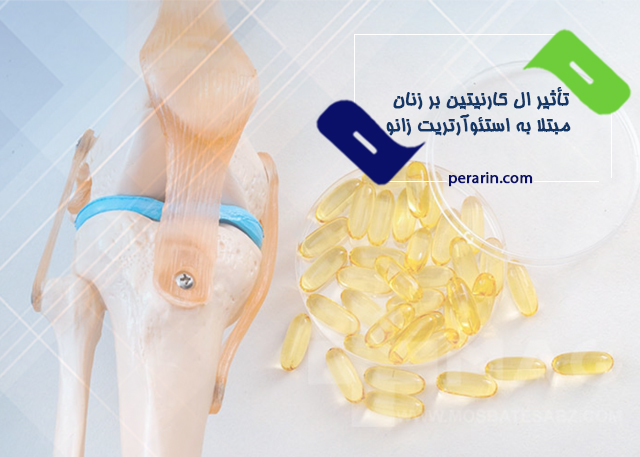The Effect of L-Carnitine and Weight Loss Diet on Anthropometric Indices in Women with Knee Osteoarthritis
Introduction
Osteoarthritis is one of the most common chronic joint diseases, and its prevalence is increasing. Women are more prone to this condition due to higher fat tissue levels and inflammatory factors.
Factors Contributing to Osteoarthritis
Genetic and environmental factors (diet, obesity, physical activity, and joint injuries) play a role in the development of osteoarthritis. An improper diet leads to weight gain, which increases mechanical pressure on the knee joints. Studies show that individuals with a body mass index (BMI) over 30 are four times more likely to develop osteoarthritis.
The Impact of Weight Loss on Osteoarthritis Improvement
In women with osteoarthritis, losing 2 kg of weight reduces joint pressure by 7%. This reduction in mechanical stress prevents further cartilage damage and contributes to osteoarthritis improvement.
The Role of L-Carnitine in Treating and Improving Osteoarthritis
L-Carnitine supplementation has gained attention in osteoarthritis treatment from a nutritional perspective. It plays a role in glucose metabolism by reducing acetyl-CoA levels, increasing energy metabolism. Additionally, by facilitating fatty acid transport into the mitochondria, it enhances fatty acid oxidation and reduces body fat levels. These effects of L-Carnitine on blood sugar and fat levels may contribute to faster osteoarthritis improvement.
Prevention and Treatment of Osteoarthritis
Animal and in vitro studies have shown that L-Carnitine increases cartilage cell proliferation, ATP production, and the repair of damaged cells, helping to prevent and treat osteoarthritis. A study on 120 patients found that L-Carnitine supplementation reduced pain levels and clinical symptoms in osteoarthritis patients.
So far, no study has examined the simultaneous effect of a weight loss diet and L-Carnitine supplementation in this disease. Given the high prevalence of osteoarthritis, particularly in women, and its associated disabilities, along with the limited human studies on the effects of L-Carnitine in improving osteoarthritis, this study aims to evaluate the impact of L-Carnitine supplementation on anthropometric indices in obese women with knee osteoarthritis following a weight loss diet.
Study Methodology
Inclusion criteria included:
- BMI over 25
- Age between 45 to 70 years
- No supplement consumption in the past three months
- No weight loss diet in the past three months
- No participation in other intervention programs
- Willingness to lose weight
- No history of heart, liver, kidney disease, diabetes, hypothyroidism, rheumatoid arthritis, or surgery
After signing the informed consent form, participants were randomly assigned to an intervention group (21 individuals) and a control group (22 individuals).
Participants in the intervention group received one 1000 mg L-Carnitine tablet daily along with a weight loss diet, while the control group received a placebo identical in color, shape, and weight, along with a weight loss diet for 12 weeks. Patients were advised to take the tablets after breakfast or lunch. The weight loss diet was determined based on individual daily energy needs using the Harris-Benedict formula, incorporating activity level and food energy consumption.
Over the 12-week period, each participant was required to consume 90 capsules. To ensure compliance, the capsules were packaged in bottles containing 30 tablets, and participants were asked to return the empty bottles at their next monthly visit before receiving a new bottle.
Study Findings
Although waist circumference, hip circumference, BMI, and weight significantly decreased in both groups, the only significant difference between the two groups was in waist circumference reduction.
The Impact of Weight Gain
Weight gain contributes to osteoarthritis progression by increasing inflammatory factors. Additionally, in the knee area, the mechanical pressure caused by excess weight leads to more pain. L-Carnitine facilitates fatty acid transport across the mitochondrial membrane, enhancing beta-oxidation and reducing blood fatty acid levels. Thus, weight loss not only reduces mechanical pressure but also decreases inflammatory factors.
In this study, due to the weight loss diet, significant changes in anthropometric indices were observed in both groups, except for the waist-to-hip ratio. However, in the intervention group, 1000 mg of L-Carnitine resulted in a significant reduction in waist circumference. A higher dose or longer intervention period may lead to more substantial changes in study results. This study demonstrated that 1000 mg of oral L-Carnitine could significantly reduce waist circumference.

